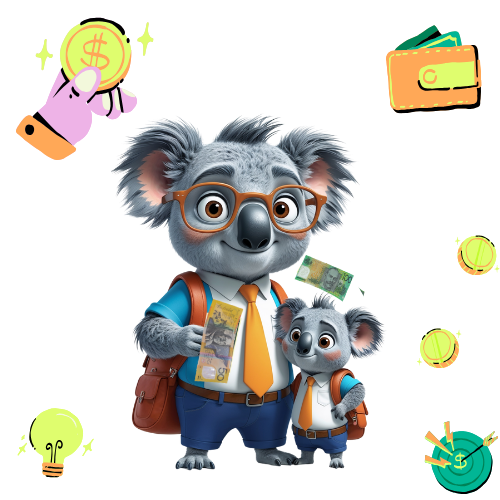Teachers and Parents
Earning Money
A Practical Guide for Growing Minds

Empowering Young Australians to Earn Responsibly – by Age and Stage
Whether it’s helping around the house, launching a lemonade stand, or babysitting the neighbour’s kids, learning how to earn money helps kids and teenagers build confidence, independence, and financial smarts.
This guide introduces age-appropriate ways to earn, the difference between chores and small business ventures, how to price your time and services, and (for teenagers) a simple look at taxes in Australia.
🐨 Ages 5–7: Little Helpers
As every teacher and parent knows, some of life’s most powerful lessons aren’t taught in classrooms — they’re learned by doing.
And when it comes to money, there’s no substitute for earning it. This guide is designed to help educators and caregivers introduce children and teens to real-world earning experiences — framed through curiosity, creativity, and confidence.
From pulling weeds for pocket change to launching a mini-business, we unpack age-appropriate ways kids and teens can earn money, understand value, and take their first steps toward financial independence.
Planting the seeds of effort and reward.
At this stage, earning money should feel playful, positive, and purpose-driven. It’s about building foundational habits, celebrating effort, and introducing the concept of value through simple tasks.
What Earning Looks Like:
- Helping set the dinner table
- Tidying their room (and a sibling’s)
- Watering plants or feeding pets
- Completing “bonus chores” beyond daily expectations
Teaching Focus:
- Use visible progress tools (e.g., sticker charts or tokens)
- Introduce the “Spend, Save, Share” jars to visualise money flow
- Reinforce the difference between being helpful (family duty) and going above and beyond (earning opportunity)
🎯 Key Insight: When kids feel pride in their contribution, they start to associate effort with reward — not entitlement.
🦘 Ages 8–12: Smart Spenders in the Making
Turning initiative into income
This is a golden age for exploration.
Kids are full of ideas — and ready to test them out.
With guidance, they can begin experimenting with structured chores and micro-entrepreneurship.
Age-Appropriate Earning Ideas:
- Running a lemonade stand or weekend bake sale
- Pet sitting or walking dogs for neighbours
- Washing cars or raking leaves
- Selling handmade crafts or digital art prints with a parent’s help
Chores vs. Entrepreneurship:
- Chores: Typically home-based, guided, and part of a structured system
- Entrepreneurship: Self-directed, creative, and often involves planning, customer interaction, and pricing decisions
How to Price:
- Walk through cost-based pricing: e.g., if it costs $4 to make a batch of cookies, what’s a fair profit?
- Introduce basic negotiation concepts: asking, listening, adjusting
🎯 Key Insight: Kids learn best when they own their experience. Encouraging them to set prices or advertise services builds autonomy, problem-solving, and resilience.
🦉 Ages 13–17: Future Earners, Real Lessons
Bridging the gap between school and the real world
Teenagers are ready for more than theory — they want to do.
Whether they’re working after school, freelancing, or launching their own side hustle, this is where money meets mindset.
Real-World Earning Ideas:
- Babysitting or tutoring
- Lawn mowing or odd jobs
- Part-time work in cafes, retail, or local businesses
- Monetising digital skills (e.g., video editing, graphic design)
Pricing Strategy:
- Introduce market-based thinking: what are others charging?
- Factor in time, travel, skill level, and material costs
- Consider hourly vs. flat-rate models
Talking Taxes — Simplified:
- Teens should apply for a TFN (Tax File Number) before their first paid job
- The tax-free threshold is $18,200 — if they earn less, they can still lodge a return to claim withheld tax
- Encourage them to keep a simple earnings log (or use a budgeting app)
🎯 Key Insight: The earlier teens learn about taxes, superannuation, and payslips, the more confident they’ll feel stepping into adult responsibilities.
👩🏫 Downloadable Extras:
✨ Tools & Printables (Coming Soon):
- Allowance & Chore Tracker (Ages 5–7)
- My First Side Hustle Planner (Ages 8–12)
- Service Pricing Worksheet (Ages 13–17)
- Getting Your TFN – Teen Guide
- Tax & Super Basics – Classroom Poster
🧭 For Teachers & Parents: Support Tips
- Use real-life scenarios to spark discussion (e.g., “How would you price dog walking in our neighbourhood?”)
- Encourage reflection with journaling: “What did I learn from my first job?”
- Promote growth mindset: Earning money takes trial, error, and perseverance
Final Thought
Teaching children and teenagers how to earn money is more than a financial lesson — it’s a values lesson.
Effort. Integrity. Initiative.
These qualities shine when kids are given the chance to earn, experiment, and evolve.
And with the right support, they'll carry those traits well into adulthood.


